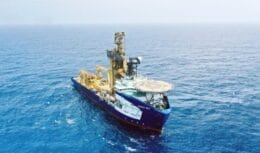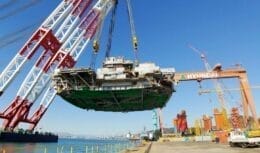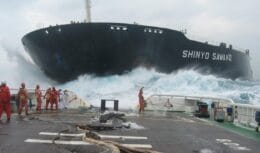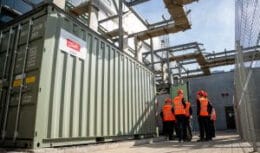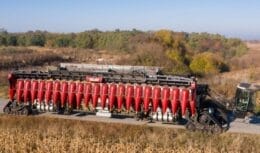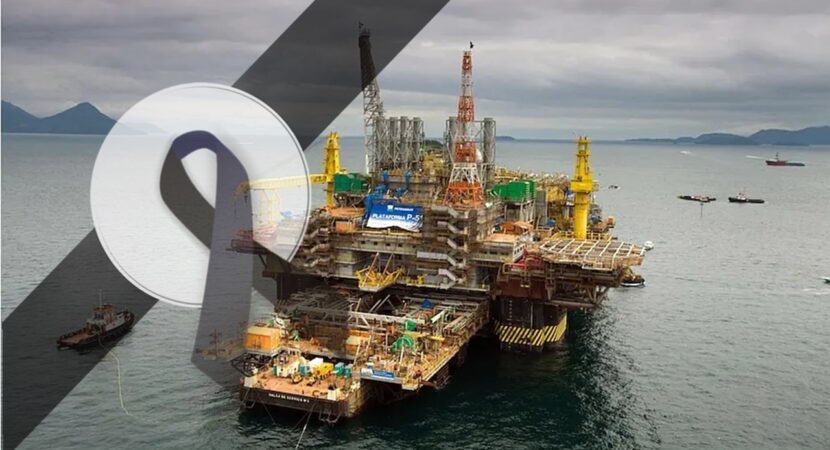
Petrobras confirmed to Click Petróleo e Gás, this morning (22), the death of the Mechanical Technician worker on board the P 51 platform, in the Campos basin
Sad news yesterday morning (21/04): the technical worker in mechanics, identified as Joceil Martins da Fonseca, 41, was found dead on oil platform P-51, owned by Petrobras, in the Campos Basin. Information about the fatality was confirmed to our press office, this morning (22), by Petrobras. The state-owned company highlighted CPG – Click Oil and Gas that the case is under investigation by the competent authorities. Although other portals are disclosing information on criminal proceedings, they have not yet been officially disclosed. Here's what has been found so far in the course of the matter.
Read also
- Petrobras will invoice billionaire compensation in two large pre-salt fields that were stranded in the last bid
- Elementary and high school job openings open today (21/04) to work at an ethanol plant
- Heineken, the multinational leader in beer production, calls for more than 90 job openings in the Helper function, in Rio de Janeiro
- Odebrecht distributes millionaire bonuses to employees; in parallel, the group's ethanol plants have filed for bankruptcy
According to information, the tanker resided in Campos and was an employee of the offshore outsourced company SOTREQ. Joceli took her own life aboard Petrobras' P51 platform, and her body was found under the helipad by co-workers.
“On the morning of this Wednesday, the 21st, we received information from the oil industry that there had been a death on board Platform P-51. After contacting the unit's workers, the news was confirmed. The mechanic of the SOTREQ company, which provides services to Petrobras on the P-51 platform, Joceil Martins da Fonseca, aged 41, was found dead on the platform,” Sindipetro-NF said in a statement.
Sindipetro-NF gave solidarity to the mechanic's family
“Sindipetro-NF has as its historic flag the fight for better working conditions on board that influence mental health. Since the beginning of the pandemic, the situation has worsened, in which companies have unilaterally changed boarding scales, causing the environment to deteriorate. It is worth noting that, currently, leave due to mental problems is the second leading cause of leave from work at Petrobras facilities. O Sindipetro-NF regrets the death of another worker in the workplace and will be available to the family to provide all necessary support”.
For now, the causes of death and other information about the case have not yet been officially released. This report may be updated.
This is the second case of death on a Petrobras platform this year
A worker, employee of the company Sistac, died in January of this year in an accident during an inspection activity in the Petrobras FPSO, the Cidade Mangaratiba, currently chartered by the Japanese company Modec. Here is the official statement issued by Petrobras at the time:
Petrobras regrets to inform that, this Sunday (31/01), an industrial climber from the company SISTAC died after a fall during an inspection on a tank of the FPSO Cidade de Mangaratiba, chartered from MODEC, which operates in the Tupi field, in the Santos Basin. The employee immediately received medical attention at the scene, but did not resist. Petrobras is in contact with Sistac and MODEC, who will provide support to the family. The company will monitor the case and, together with MODEC, will create a commission to investigate the occurrence”, concludes Petrobras in an official note to the Click Oil and Gas.
Forced to spend a month in isolation, oil workers say they have reached their limit
The security measures implemented by the Petrobras to contain Covid-19 many workers on offshore platforms have become ill. Category unions and company employees report cases of depression, panic attacks and other mental illnesses caused by errors in the scale and excessive isolation.
Since the beginning of the pandemic, oil tankers have had to quarantine in hotels before embarking on offshore platforms. Depending on the region, they stay between 7 and 14 days locked in a room, without contact with people and receiving food by the door. The emotional impact of this routine, which has lasted for a year due to the pandemic, has sickened countless professionals.
A Single Federation of Oil Workers (FUP) pointed out that, recently, Petrobras changed the shift schedule without notifying workers in advance. With that, depending on the quarantine period, employees can reach more than 30 days in isolation per shift. Still according to the entity, some professionals stay up to 1 month on board and 26 days off.
According to the occupational physician at Sindipetro – NF Ricardo Garcia Duarte, this is already an exhausting, long journey that requires a lot of people's physical and mental health.
“Oil tankers do not have autonomy when boarding and must follow strict rules: there is a time for everything, they do not choose what they eat and they need to wear specific clothes and safety equipment. Not to mention the pressure of work. If an employee is not attentive, it can cost him and other people their lives”, explains Duarte.
The doctor says that the pandemic has increased the emotional weight of work carried out by oil workers. They went on to have normal life every other month. Added to this, another factor that has made the class even more apprehensive: “In the pandemic, in addition to the chemical risks of death, the category now has a biological risk of death.”
According to reports from workers, the quarantine time in hotels, added to the period in which they are on board, has taken the category to an emotional limit. "Friends have become alcoholics, others take black medicine - without a medical prescription - and spend the time of isolation sleeping, they only wake up on the day of leaving the room", said an oil worker.
The other side
Contrary to what oil workers say, Petrobras claims that the 14-day pre-shipment quarantine, for the oil company's own units, is done "with monitoring and guidance by health teams". The state-owned company also states that hotel accommodation can occur up to three days before the oil tanker embarks, to carry out the exam collection. RT PCR and wait for the result.
In addition, according to the oil company, regarding the emotional issue of oil workers, the company states “that potential emotional effects of stress situations caused by the Covid-19 pandemic are not specific to the boarding regime. These are the general effects of the pandemic to which anyone is subject.” Furthermore, it states that the service is provided by a team of company psychologists, on an individual basis and with a guarantee of secrecy.
Regarding the boarding scale, the company says that, due to the pandemic, it adopted extended scale, in which employees spend 21 days on board and 28 to 35 days at home. “In this way, we reduce turnover and the level of contagion”, he explains. As for outsourced workers, she says that the employer is responsible for the scale.

